2010 Toyota FJ Cruiser Service, Tires & Repairs
Get Started
Complete Auto Care for Your 2010 Toyota FJ Cruiser
-
TIRES FOR YOUR 2010 Toyota FJ Cruiser View Tire Info GET TIRE PRICING
-
REPAIR FOR YOUR 2010 Toyota FJ Cruiser View Repair Info SCHEDULE REPAIR
-
MAINTENANCE FOR YOUR 2010 Toyota FJ Cruiser View Maintenance Info SCHEDULE MAINTENANCE
-
OFFERS FOR YOUR 2010 Toyota FJ Cruiser Limited Time Tire Offers VIEW ALL COUPONS
2010 Toyota FJ Cruiser Tires
Recommended Tires | Tire Information
2010 Toyota FJ Cruiser Tires Sizes, Speed Ratings, and Inflation
Not sure about your 2010 Toyota FJ Cruiser tire size? Use the following chart to find information on tire size, speed rating, and inflation.
| Trim Level | Speed Rating | Inflation in PSI F/R | Tire Size |
|---|---|---|---|
| 2010 Toyota FJ Cruiser Base* | S | 32 PSI/32 PSI | P265/70R17 |
| 2010 Toyota FJ Cruiser Base* | T | 32 PSI/32 PSI | P265/75R16 |
|
2010 Toyota FJ Cruiser Base* Speed Rating: S Inflation F/R: 32 PSI/32 PSI |
|
2010 Toyota FJ Cruiser Base* Speed Rating: T Inflation F/R: 32 PSI/32 PSI |
* Note: these models have different tire sizes depending on vehicle options.
Recommended Tires for Your 2010 Toyota FJ Cruiser
What tires are best for a 2010 Toyota FJ Cruiser? Check out the following tire brands and types.
 ALENZA AS ULTRA
ALENZA AS ULTRA
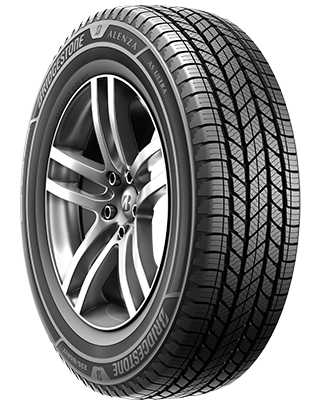
- No warranty
- All-Season
- Light Truck Tires
 Blizzak DM-V2
Blizzak DM-V2
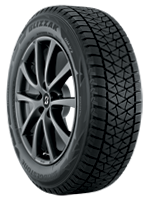
- No warranty
- Winter
- Winter
 Dueler A/T Revo 3
Dueler A/T Revo 3
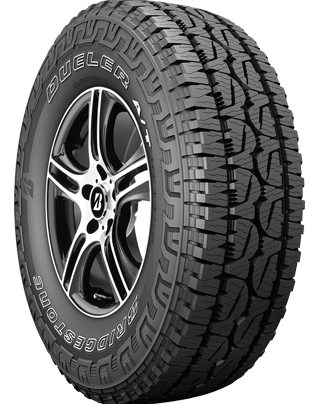
- Platinum Pact Limited Warranty
- All-Season
- Light Truck Tires
 Dueler A/T Revo 3 - LT
Dueler A/T Revo 3 - LT
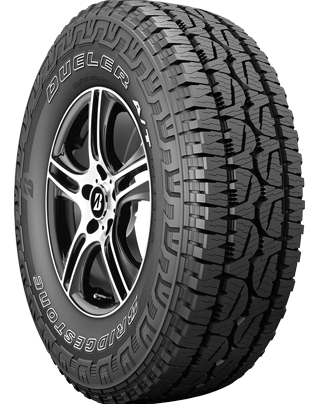
- Platinum Pact Limited Warranty
- All-Season
- Light Truck Tires
 Dueler A/T RH-S
Dueler A/T RH-S
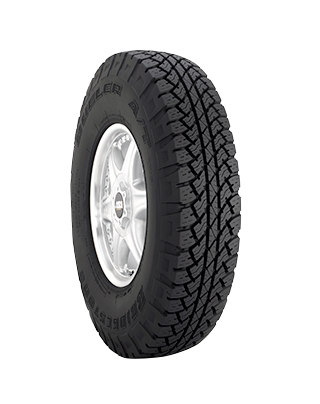
- Platinum Pact Limited Warranty
- All-Season
- Light Truck Tires
 Dueler H/T 684 II
Dueler H/T 684 II
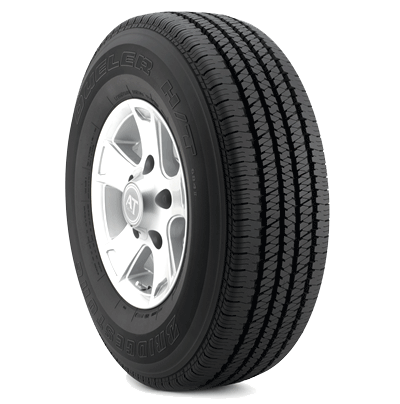
- Platinum Pact Limited Warranty
- All-Season
- Light Truck Tires
 Destination A/T2
Destination A/T2
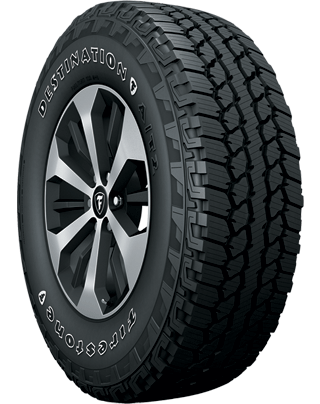
- Gold Pledge Limited Warranty
- All-Season
- Light Truck Tires
 Destination LE3
Destination LE3
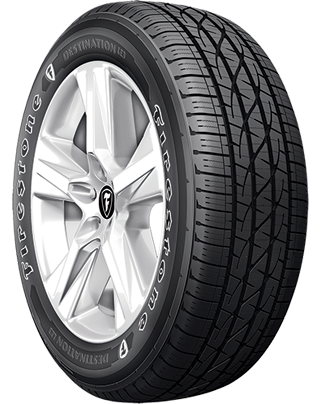
- No warranty
- All-Season
- Light Truck Tires
 Destination X/T
Destination X/T
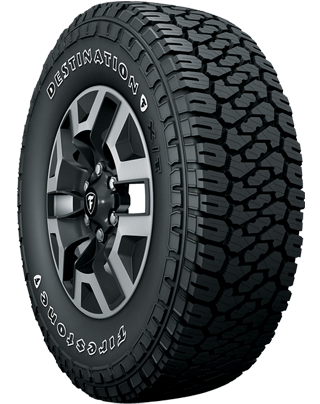
- Gold Pledge Limited Warranty
- All-Season
- Light Truck Tires
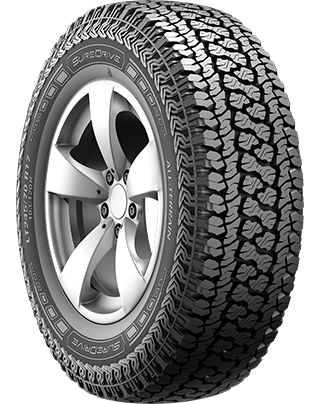
- No warranty
- All-Season
- Light Truck Tires
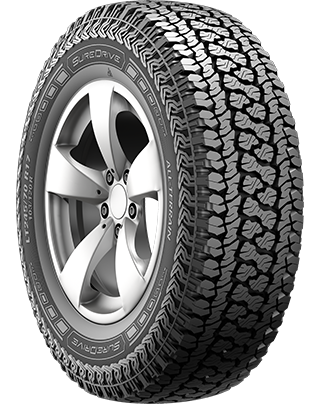
- No warranty
- All-Season
- Light Truck Tires
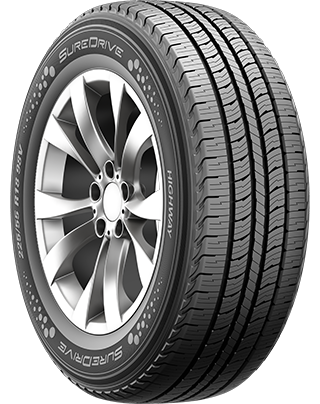
- No warranty
- All-Season
- Light Truck Tires
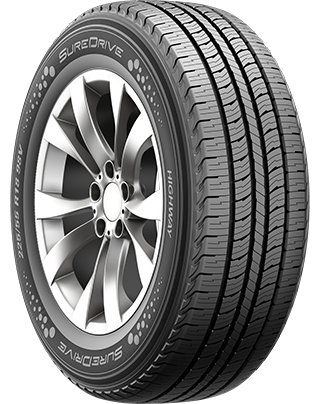
- No warranty
- All-Season
- Light Truck Tires
 OPEN COUNTRY A/T III
OPEN COUNTRY A/T III
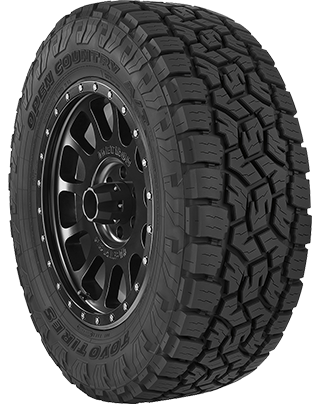
- No warranty
- All-Season
- Light Truck Tires
 OPEN COUNTRY HTII
OPEN COUNTRY HTII
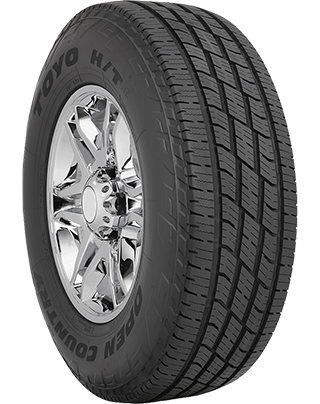
- No warranty
- All-Season
- Light Truck Tires
2010 Toyota FJ Cruiser Tire Information
Apart from finding the right tire size, you also want to think about a couple of other things when getting new Toyota FJ Cruiser tires like where and how you drive, and what tire brand you trust most. Think about where you live (countryside vs. city vs. mountains) and the kind of unexpected weather you're likely to experience when evaluating your driving conditions. Drivers in states that fully experience all four seasons often buy two sets of tires: one for winter and one for summer. Other drivers prefer the convenience of all-season tires. They make one trip to the tire shop and they're pretty much ready for rain, light snow, or sun!
Your personal driving style is the next factor to consider. If you're an avid off-roader who yearns to pioneer new paths, you have very different tire needs than a highway commuter who doesn't hit the hills very often. Talk to a tire technician at Firestone Complete Auto Care for help choosing the best tire for you, or start shopping for Toyota FJ Cruiser tires online.
Toyota FJ Cruiser Installation and More
Firestone Complete Auto Care installs more tires on more cars than most other companies. We're a tire store that also offers professional tire installation, maintenance, and rotation, along with complete auto care. Buy 2010 Toyota FJ Cruiser tires online and schedule your installation when it's convenient for you.
2010 Toyota FJ Cruiser Tire Questions
-
Why does Toyota tire inflation matter? A small decrease in tire pressure can have a big impact on your driving. Maintaining proper tire pressure can help improve braking time, increase fuel economy, and boost tire lifespan.
-
Why are there numbers on the side of my Toyota FJ Cruiser tires? The numbers on your tire sidewall give you information about tire speed rating, traction, treadwear, tire size, and load carrying capacity. Chat with a tire technician to learn how to read the numbers on your Toyota tires!
-
Is there an easy way to check Toyota tire tread depth? Stay on top of your tire tread depth to help avoid a dangerous drive. You can check tread depth with a penny. Hold the penny so that Abraham Lincoln is facing you, then place your penny into a tread groove upside down. If you can see the top of Abe’s head, your tread is shallow and it might be time for new Toyota FJ Cruiser tires. Grab a penny. Hold the so that Abe Lincon's head is facing you and his hair is pointing toward the ground. Then, place the penny into a tread groove. If you can see the top of Abe’s head, your tread is shallow and it might be time for new Toyota FJ Cruiser tires.
2010 Toyota FJ Cruiser Repair
How do I learn more about auto repairs? Click on a service below to read about the types of Toyota FJ Cruiser repairs we do at Firestone Complete Auto Care.
Get Repairs for Your 2010 Toyota FJ Cruiser
No driver looks forward to car repairs. But we work to provide you with a different experience at Firestone Complete Auto Care. Bring your 2010 Toyota FJ Cruiser in for repair services and rest easy knowing that your FJ Cruiser is in capable hands. Before we begin any repair work, we’ll diagnose any issues and answer your questions about potential repair options. If a repair isn't necessary, we won't recommend it.
What Will Toyota FJ Cruiser Repairs Cost?
The cost to repair your 2010 Toyota FJ Cruiser depends on what kind of repair you need, costs of replacement parts or repair supplies, how much labor the repair will take, and the state you live in. And check back often — we update our deals regularly!
A few different aspects can influence repair costs for your 2010 Toyota FJ Cruiser, like
2010 Toyota FJ Cruiser Auto Repair Questions
-
Do I need to follow Toyota's maintenance schedule? The cheapest 2010 Toyota FJ Cruiser repair is the one that isn’t necessary in the first place! Staying up-to-date with your car’s scheduled maintenance services is a great way to keep future repair costs low.
-
What does it mean to be 'in tune' with your car? You know your vehicle. You also know when something feels 'off' with your vehicle. Pay attention when things don't run like they used to and stop by for a Courtesy Check when you notice an unusual sign, smell, or sensation. We might be able to help you prevent Toyota FJ Cruiser repairs!
-
Are the repairs you recommend for my Toyota actually needed? Talk to your technician. We'll never recommend a service or repair for your 2010 Toyota FJ Cruiser that we don't think is necessary for your safety.
2010 Toyota FJ Cruiser Brake Repair
You might have a strong and reliable engine in your Toyota FJ Cruiser. But if you can’t stop it, it’s as good as scrap metal. If you’re experiencing squeaky brakes or a loss of braking power, don’t wait! Unresponsive brakes make it tough to give the road your best. Plus, waiting can lead to more expensive parts wearing out and requiring replacement. Visit Firestone Complete Auto Care for the right brake repair for your 2010 Toyota FJ Cruiser. We offer a variety of brake services like brake pad/shoe replacement, brake rotor/drum refinishing, brake fluid exchange/bleeding, and brake caliper and wheel cylinder service.
Answers to Your FJ Cruiser Brakes Questions
-
What can cause my FJ Cruiser to shake when I apply the brakes? Your FJ Cruiser could shake when you brake due to worn brake pads or rotors, warped rotors, loose or worn suspension components, or faulty brake calipers. You can always schedule a free brake inspection at the first sign of strange brake behavior.
-
How long can I expect my FJ Cruiser brake pads to last? In general, brake pads can last from 30,000 to 40,000 miles. Certain factors, like driving on highways mostly and braking smoothly, can help your brake pads last longer. Hauling heavy loads and riding your brakes can shorten brake pad lifespan.
-
Does brake fluid leak when the car is off? Your FJ Cruiser brake system is a closed hydraulic system, so a brake fluid leak likely means you have an issue in your brake system. Over time, brake components can wear out or get damaged, causing a brake fluid leak.
When to Get Toyota FJ Cruiser Drivetrain Repairs
Drivetrains for front, rear, and all-wheel-drive and 4WD vehicles are quite different, so you don't want to go to just anyone for drivetrain repair. You want to come see the technicians at Firestone Complete Auto Care. We can help repair all of your 2010 Toyota FJ Cruiser drivetrain components Your FJ Cruiser might need driveshaft repair if you notice clunks when shifting, vibration as your vehicle accelerates, resistance when turning, or heavy vibrations in your floorboards.
Questions About 2010 Toyota FJ Cruiser
-
What are signs my Toyota drivetrain is damaged? Your Toyota FJ Cruiser drivetrain might be damaged if you notice strange noises from the rear of your vehicle, see fluid leaking, or have issues turning.
-
Why is my FJ Cruiser malfunction indicator light (MIL) on? The malfunction indicator light — also known as the check engine light — on your FJ Cruiser can illuminate for a variety of reasons, including engine issues, electrical problems, damaged sensors, transmission problems, misfires, and faulty connections.
-
Is a drivetrain malfunction in my FJ Cruiser serious? If you experience a drivetrain malfunction in your FJ Cruiser, it is important to have it inspected by a professional mechanic as soon as possible to identify the underlying cause and perform the necessary repairs. Driving with a malfunctioning drivetrain can be dangerous and cause further damage to your car.
Wheel Alignment for 2010 Toyota FJ Cruiser
Alignment services involve precise adjustments to your Toyota FJ Cruiser’s suspension system, which serves to attach your wheels to your vehicle. In an alignment service, the individual angles of your tires are adjusted so that they come into contact with the road in just the right way — the way Toyota intended them to. Bring your 2010 Toyota FJ Cruiser in for a wheel alignment and we'll start with an alignment check. After that, we can adjust your wheel alignment angles until they match Toyota’s recommended measurements.
Toyota FJ Cruiser Alignment Questions
-
What can knock my Toyota FJ Cruiser out of alignment? Hitting a pothole or curb can alter your wheel alignment. So can general wear and tear over time.
-
How often should you get a wheel alignment for your FJ Cruiser? It’s usually suggested you check your alignment about every 6,000 miles or 6 months (whichever occurs first). Still, you should reference your FJ Cruiser owner’s manual for Toyota's recommended interval.
-
Does getting new FJ Cruiser tires mean you need an alignment? You likely aren't required to get an alignment when you put new tires on your FJ Cruiser, but it's a super smart idea! An alignment can help ensure optimal tire wear, fuel efficiency, and handling. Still, you should reference your FJ Cruiser owner’s manual for what’s recommended.
2010 Toyota FJ Cruiser Engine Services
If your 2010 Toyota FJ Cruiser needs engine repair, our technicians will make sure you understand what’s going on before they start working on your engine. We make recommendations, but you make the final decision. If a repair isn’t urgent right now, we’ll let you know. If it's necessary for your safety, we'll make sure you understand that, too. We want to give you all the details you need to make an informed decision about your engine repairs. Turn to Firestone Complete Auto Care for your 2010 FJ Cruiser engine repairs and you can feel confident knowing that we use Toyota-approved parts and components like the cambelt, valve guide seal, sensors, or a different component.
Engine Q&A 2010 Toyota FJ Cruiser
-
Why does the check engine light come on when I start my FJ Cruiser? It’s usually normal for your check engine light to turn on upon ignition. This is just your FJ Cruiser testing its circuits. The dash light shouldn't stay on. If it does, you might want to bring your vehicle in for service.
-
Why is my Toyota FJ Cruiser making engine noise? Strange engine sounds can be a sign something’s off in your Toyota FJ Cruiser. Knocking or tapping could be a symptom of low oil. A high-pitched whistle could signal an intake leak or misaligned belt. Squealing can be traced back to a loose fan belt, and grinding might be a sign of brake problems rather than engine issues.
-
Are you unknowingly damaging your Toyota FJ Cruiser engine? Certain driving habits can hurt your engine. These habits include driving on an empty fuel tank, revving your engine while the vehicle is in Park, or slamming the gas pedal while the engine is still cold. Steer clear of these habits to help protect engine performance and efficiency.
Get Your Toyota FJ Cruiser Tire Repaired
If the road has been rough on your 2010 Toyota FJ Cruiser tires, Firestone Complete Auto Care can help. Our tire technicians can determine whether it's safe to plug and patch the tire, or whether it needs to be replaced. To start, we’ll consider the location of tire damage, the type of issue, the size and scope of the damage, and the amount of wear on your tires.
If your 2010 Toyota FJ Cruiser tire puncture can be repaired, the repair process is actually fairly simple: (1) Remove the tire from the wheel for inspection and repair, (2) use a filler to close up the puncture (this is to keep moisture from getting in), and (3) seal the inner liner with a repair unit to prevent air loss.
Frequently Asked Toyota FJ Cruiser Tire Repair Questions
-
What happens if I drive my Toyota on a flat tire? Driving on a flat tire is not a good idea. Your FJ Cruiser engine will keep running with a flat tire, but you could damage your wheel by continuing to drive on a flat.
-
Can I use an emergency/temporary sealant to fix my Toyota's flat tire? A temporary sealant may be able to help you get to a repair location safely. But temporary or emergency sealants could possibly damage TPMS sensors, and in some cases may even void the warranty on your Bridgestone or Firestone tires. If your tire needs extensive repair, sealant can add time and labor costs to the process.
-
What is causing the tires on my FJ Cruiser to keep losing air? If your FJ Cruiser tires are always losing air, you may have a puncture, damaged wheel, or leaking valve stem.
Maintenance for Your 2010 Toyota FJ Cruiser
Take care of your Toyota FJ Cruiser and it'll take care of you. With the right maintenance at the right time, your FJ Cruiser has a good chance of hitting 200,000 miles or more.
2010 Toyota FJ Cruiser Maintenance Schedule
What is the manufacturer recommended maintenance schedule for a 2010 Toyota FJ Cruiser? Find maintenance info for your vehicle.
About 2010 Toyota FJ Cruiser Scheduled Maintenance
Instead of waiting for an issue to arise with your FJ Cruiser, you can stay ahead of problems before they even begin. Rely on the recommended maintenance schedule that’s been created just for your 2010 Toyota FJ Cruiser! Toyota knows your vehicle inside and out (they made it, after all!), so they’ve designed this schedule with your car’s unique needs in mind. Scheduled maintenance services can vary depending on driving conditions, climate, and other factors; however, recommended maintenance usually includes services like tire rotations, vital fluid checks/exchanges, filter changes, brake pad replacement, and oil changes. Keeping up with routine service appointments is a great way to keep your FJ Cruiser running for longer, keep you safer on the road, and maybe even save you the headache of dealing with common 2010 Toyota FJ Cruiser problems in the future.
Overview of Essential Toyota FJ Cruiser Maintenance Needs
Head to your nearest Firestone Complete Auto Care in your 2010 Toyota FJ Cruiser for factory-recommended routine maintenance and a skilled technician will start the appointment with a Courtesy Check. The Courtesy Check helps us see what we’re working with under the hood, and allows us to alert you to any potential problems before they worsen. Every Courtesy Check will include a visual inspection of your FJ Cruiser. We’ll check your head and tail lights, fluid levels, filters, tires (and their alignment!), and windshield wiper blades. We’ll also perform a free battery check to determine your battery’s charge level.
Firestone Complete Auto Care is the place to go for 2010 Toyota FJ Cruiser maintenance. So visit us regularly, or visit us urgently. Many locations are open on weekends and in the evening.
2010 Toyota FJ Cruiser Maintenance Q&A
-
When should I have Toyota FJ Cruiser alignment checked? Watch out for pothole damage. If your 2010 FJ Cruiser is pulling to one side or the other, your tires or suspension system could be calling out for help.
-
When does my Toyota FJ Cruiser need high mileage oil? If your Toyota FJ Cruiser has ticked past 75,000 miles, consider switching to high mileage oil at your next oil change to give your engine what it needs to go another 75,000 (or more!). High mileage oil: make it a high priority!
-
Can I ignore dashboard lights on my Toyota? Don't ignore dashboard warning lights! Bring your Toyota FJ Cruiser in for a diagnostic code scan as soon as a dashboard warning light flashes on, whether it's your check engine or battery light. Dashboard lights alert you to trouble under the hood.
Battery Size & Replacement for 2010 Toyota FJ Cruiser
Researching battery replacements for your Toyota FJ Cruiser?
| Battery | Engine | Warranty | Cold Cranking Amps | |
|---|---|---|---|---|
| 27F-3 | V6/4.0L | Replacement 24 months | Performance months | 710 |
| 24F-6 | V6/4.0L | Replacement 36 months | Performance months | 750 |
| 24F-RP | V6/4.0L | Replacement 48 months | Performance months | 750 |
Car Batteries for 2010 Toyota FJ Cruiser
Generally, car batteries last from three to five years. Check your battery regularly and replace it as needed so it doesn’t leave you and your Toyota FJ Cruiser stranded. Watch for signs that your current battery is getting too old or too weak. A lagging starter, an illuminated battery or check engine light, swollen battery case, corrosion-covered posts, and subpar electrical performance can all signal that your battery is waving goodbye.
You can also get a Free Battery Test at your local Firestone Complete Auto Care. Drop in for a free battery check and, if needed, a replacement battery for your 2010 Toyota FJ Cruiser. Car batteries are one of our many specialties! Our technicians are familiar with Toyota-specific recommendations for FJ Cruiser battery cold cranking amps and reserve capacity. Get help choosing the battery size that fits your car perfectly, and schedule a weekday or weekend battery replacement service for your car.
Commonly Asked Toyota FJ Cruiser Battery Questions
-
Why won't my Toyota FJ Cruiser battery stay charged? A car battery that needs to be jump-started every time is as good as dead. It may be getting old. Or, you’ve been leaving the doors slightly open and the dome lights on during the night. Stop in for a free battery check at your nearest Firestone Complete Auto Care and learn more about your battery's charge.
-
How long can I expect my car battery to last? Car battery lifespan varies depending on a few factors, including driving conditions, accessories, how well it’s maintained, and the type of battery. On average, a car battery lasts about three to five years.
-
Why is there white, crusty buildup on my FJ Cruiser’s battery post? A chemical reaction between battery acid and the air can cause a white, crusty buildup to form on the terminals of your FJ Cruiser car battery. This buildup — known as corrosion — can impede the flow of electricity and cause a range of issues, from poor performance to premature battery failure.
2010 Toyota FJ Cruiser Oil Change Service
Your 2010 FJ Cruiser’s oil should be changed according to Toyota’s recommended oil change intervals. Your FJ Cruiser may need an oil change right away if your check engine/oil change light is on, you hear knocking sounds coming from the engine, smell oil inside the car, or see an excess amount of vehicle exhaust. You may also need an oil change more frequently than Toyota recommends if you haul heavy loads, frequent dusty roads, adventure off-road, or go long distances at low speeds.
Your local Firestone Complete Auto Care has the right 2010 Toyota FJ Cruiser motor oil: either synthetic or conventional. Talk with a teammate and consult your owner's manual before picking a motor oil. At Firestone Complete Auto Care, you can choose from the following oils: Quaker State® Advanced Durability™ conventional oil, Pennzoil® High Mileage Vehicle® motor oil, Pennzoil Platinum® Full Synthetic motor oil with PurePlus™ Technology, and Shell Rotella® heavy-duty engine oil. During an oil change, an auto technician will change your FJ Cruiser’s oil, replace and recycle your used oil and filter, inspect the rest of your car’s filters, top-off important fluids, and perform a courtesy inspection on your entire vehicle. Get professional engine care by making an oil change appointment for your FJ Cruiser today.
2010 Toyota FJ Cruiser Oil Change Q&A
-
What does it mean if my Toyota FJ Cruiser oil light comes on? Your Toyota FJ Cruiser oil change reminder light might illuminate if it’s been too long since your last oil change. On the other hand, the oil pressure light might illuminate due to a clogged oil filter, a faulty oil pressure sensor, low engine oil levels, or a malfunctioning oil pump.
-
Can I change my Toyota FJ Cruiser oil at home? Changing your own oil isn't as convenient as you might think. It requires special tools and old oil must be disposed of properly. Having your oil professionally changed reduces the chances of something going wrong with the oil change, but also with your vehicle down the road.
-
Why is my Toyota exhaust smoke gray or blue? You could have an oil leak and have a case of burning oil. Looks like it’s time for a professional to take a look. The leak could be the result of worn valve seals, fried piston rings, or old cylinder walls.
2010 Toyota FJ Cruiser Engine Tune-Ups & Maintenance
Routine engine tune-ups can bring power back to your FJ Cruiser. Your local Firestone Complete Auto Care offers a range of engine tune-up services for your 2010 Toyota FJ Cruiser. The first is the standard Firestone Tune-Up. This includes the installation of new spark plugs and a visual inspection of your engine’s components, plus a lifetime warranty on parts*. The second service focuses on your FJ Cruiser's filters, specifically replacing the air filter and fuel filter. The third tune-up option is a fuel system cleaning service, which is a three-step process that removes varnish, dirt, and carbon deposits on your FJ Cruiser's fuel injectors, throttle body, and throttle plate. The result? Restored fuel system performance. Here’s something to remember when choosing services: the mileage and service history of your FJ Cruiser can determine what kind of service it needs. Talk to a technician about your driving style, mileage, and service history to learn more about your vehicle's specific needs.
*Ask a Firestone Complete Auto Care teammate about full terms and conditions for warranties.
2010 Toyota FJ Cruiser Engine Tune-Up Q&A
-
When should Toyota FJ Cruiser spark plugs be replaced? Replace spark plugs on time or about every 30,000 miles or so. Spark plugs are small but mighty. The spark of electricity that the plug emits across a small gap creates the ignition for the combustion needed to start your car. Without that spark, your car won't start.
-
What do I do if I see a pool of liquid under my Toyota FJ Cruiser? Puddles could indicate that your vehicle is leaking coolant, oil, or brake fluid. Ignoring these leaks can lead to permanent engine damage, so address these symptoms ASAP with a tune-up service.
-
How often should I clean my Toyota FJ Cruiser fuel injectors? The cleaning schedule for vehicle fuel injectors varies depending on your driving conditions and the type of fuel you use. Some manufacturers suggest cleaning your fuel system as part of routine maintenance, while others will recommend it on an as-needed basis if you’re experiencing poor performance. Reference your Toyota owner’s manual for exact guidelines.
Suspension Service & Repair for 2010 Toyota FJ Cruiser
When you first bought your 2010 Toyota FJ Cruiser, you probably enjoyed a smooth and steady ride. Now, however, things are starting to feel a little rough. Maybe your FJ Cruiser jolts, pulls to one side, or makes a weird sound when you drive over a speed bump or turn. The first sign of problems is a good time to bring your 2010 Toyota FJ Cruiser in for steering and suspension repairs. We’ll get to the root of the issue and, if your car needs steering and suspension repairs, we’ll explain what your car needs and how much it’ll cost to get it done. We won't begin any work without your permission.
2010 Toyota FJ Cruiser Steering & Suspension Questions
-
What can cause my Toyota FJ Cruiser to have a bouncy ride? Excessive bouncing in your Toyota FJ Cruiser might be due to damaged struts or shocks that are unable to absorb road bumps effectively, causing your vehicle to feel more like a pogo stick than a smooth ride.
-
Why does my FJ Cruiser's nose dive down when I hit the brakes? The forward momentum and weight transfer to the front wheels during braking can cause your FJ Cruiser's front end to dip forward. A damaged or faulty suspension system may fail to distribute the weight and force effectively, causing the front end to dip even more.
-
Does tire pressure and tread depth impact my Toyota's suspension? Keeping your tires properly inflated can help reduce strain on the suspension, and also help you notice when you need new tires. A tire that doesn't have an adequate amount of tread can't grip the road or function as well as the manufacturer intended.
Convenient & Local 2010 Toyota FJ Cruiser A/C Service
Technicians at Firestone Complete Auto Care are ready to help you address your 2010 Toyota FJ Cruiser A/C problems. During this initial A/C performance check, we’ll look at the state of your 2010 Toyota FJ Cruiser’s A/C system to see if repair work is required. This check will include an examination of system pressure, a visual inspection, and a leak test.
While your 2010 Toyota FJ Cruiser’s air conditioner is being serviced, we’ll also do an A/C evacuation and recharge. To do this, one of our technicians will remove the refrigerant in your A/C system (if there is even any left to remove). Next, they will evacuate the system according to Toyota's recommendations. To finish, we’ll add new refrigerant to recharge the A/C system.
2010 Toyota FJ Cruiser A/C System FAQs
-
Why do I get hot air from my FJ Cruiser A/C? An A/C blowing hot air has several possible root causes. There could be an issue with your compressor clutch, a blown fuse, a leak, or a clog in the expansion valve.
-
What causes A/C system leaks? To put it simply, age and moisture are some of the main causes of leaks in your A/C. Over time, rubber gaskets and seals can wear out, which pushes much-needed refrigerant out of your FJ Cruiser’s A/C system — and lets outside moisture get in, which can take a toll on internal A/C components.
-
Why won’t my FJ Cruiser’s A/C cool the vehicle when the car is stopped? A problem with one or more of your air conditioning or electrical system components could cause the A/C to only work when your FJ Cruiser is moving. You may be low on refrigerant, or the cooling fan could be faulty.
2010 Toyota FJ Cruiser Transmission Service & Repairs
Your transmission carries power from the engine to the wheels so that you can drive at the speed you desire. Since the transmission has to translate the precise amount of power for your desired amount of speed, a tiny transmission issue can take a major toll on your car’s performance. Toyota FJ Cruiser transmission problems can present themselves as shifting delays, jumping or grinding during acceleration, a feeling of shakiness, or a burning smell or whistling sounds coming from under the hood. Let Toyota FJ Cruiser transmission problems linger and you might notice your fuel economy decrease or find that your FJ Cruiser isn’t working at all. Our expert techs are familiar with 2010 FJ Cruiser services and perform them according to Toyota-recommended specifications. If you think there’s something wrong with your FJ Cruiser’s transmission, schedule an appointment at your local Firestone Complete Auto Care to help keep your Toyota running for miles and miles.
2010 Toyota FJ Cruiser Transmission Questions & Answers
-
When should I have my FJ Cruiser's transmission fluid checked or exchanged? Regularly checking and exchanging your 2010 FJ Cruiser’s transmission fluid is one of the best ways to help the transmission system perform. Some technicians would say that between 30,000 and 60,000 miles is a good timeframe for having your Toyota's transmission fluid checked and replaced, but that timeline can vary depending on how your vehicle is used and your manufacturer’s recommendations. The good news is that transmission fluid leaks are affordable to repair and easy to spot.
-
Can Toyota FJ Cruiser transmission fluid leak? Over time, transmission fluid can leak from your Toyota FJ Cruiser, potentially causing transmission problems. A transmission fluid leak may be caused by a damaged transmission pan, faulty transmission cooler lines, worn-out seals, a cracked transmission housing, or an overfilled transmission.
-
Can I still drive my Toyota FJ Cruiser if it has a transmission fluid leak? You should avoid driving with a transmission fluid leak. Your transmission system relies on transmission fluid to operate properly, and a leak may decrease performance, cause your FJ Cruiser to overheat, or even lead to transmission failure.
2010 Toyota FJ Cruiser Inspections
At Firestone Complete Auto Care, we perform a multi-point Courtesy Check during any vehicle service. First, a technician will pop the hood on your Toyota FJ Cruiser and test the battery to find out how much charge is remaining on it. The check will continue with a visual inspection of your Toyota FJ Cruiser's windshield wiper blades, lights, filters, fluid levels, belts, hoses, tires, and alignment.
We perform a Courtesy Check any time you bring your car to a local Firestone Complete Auto Care for service, but we also offer an in-depth Complete Vehicle Inspection for your 2010 Toyota FJ Cruiser. A Complete Vehicle Inspection includes everything in a Courtesy Check, plus an examination (by hand!) of your steering and suspension system, brakes, and exhaust components. With this inspection, we want to help you stay on top of any issues that may wreak havoc on your 2010 Toyota FJ Cruiser if left unaddressed.
In some cities or states, your local Firestone Complete Auto Care may be able to perform state-mandated inspections or safety tests on your vehicle. Specific requirements for these types of inspections vary by state.
2010 Toyota FJ Cruiser Vehicle Inspection Q and A
-
How do I know if my Toyota FJ Cruiser needs a check-up? You drive your car, day in and day out, so you know it best. If you notice unusual engine noises or you can’t shake the feeling that something is 'off,' start with a Courtesy Check to stay ahead of potential issues.
-
Help! My 2010 Toyota FJ Cruiser failed the state inspection test. Can you get it to pass? There's a good chance we can. Stop by for a full system inspection and we'll get to the root of the issue.
-
What's the ideal timing for a full vehicle inspection on my Toyota FJ Cruiser? It’s generally a good idea to get a complete vehicle inspection for your Toyota FJ Cruiser before a road trip and/or when something strange occurs and you are unable to find the cause. Signs something is up include dashboard lights illuminating, odd noises coming from the engine, and your steering feeling loose or tight.
2010 Toyota FJ Cruiser Radiator Service
Regular, proactive service on the radiator in your 2010 Toyota FJ Cruiser is crucial to keep your engine in the best possible shape for years to come. Toyota recommends that you replace coolant (also called antifreeze) at certain intervals, but it’s also wise to keep an eye out for signs of a failing radiator. Your radiator could be close to causing an engine breakdown if you notice leaking coolant, overheating, or an illuminated low coolant dashboard light.
If you bring your vehicle to Firestone Complete Auto Care, we start with a comprehensive inspection of your Toyota FJ Cruiser’s cooling system. Then, we’ll move on to a machine-powered coolant exchange. Finally, we’ll refill the flushed sealants, lubricants and chemicals, then do a pressure check to catch any possible leaks. From the radiator cap to the heater core, we’re here to give your 2010 Toyota FJ Cruiser the top-notch service it needs.
Common Toyota FJ Cruiser Radiator Questions
-
What does the coolant light on my Toyota dashboard mean? Your engine might be about to overheat. If your low coolant light is on, pull over in a safe area and wait for your engine temperature to go down. Once it’s safe to do so, bring your car to your nearest Firestone Complete Auto Care to have the coolant system inspected.
-
Why is my FJ Cruiser overheating? If your Toyota FJ Cruiser engine overheats, it could be because of a clogged radiator, a damaged thermostat, a faulty cooling fan, a malfunctioning water pump, or low coolant levels.
-
What can cause a FJ Cruiser radiator to make boiling or rumbling sounds? Air pockets in your FJ Cruiser’s cooling system may cause a rumbling or boiling noise. You could also have a clogged radiator or simply need to replace the radiator cap.